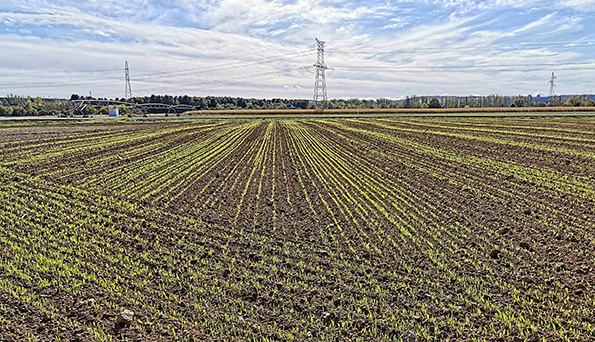“Agricultural systems are key to reduce pressures exerted on ecosystems”
ETSIAAB professor Alberto Sanz coordinates a transnational cooperation project that will develop sustainable crop management proposals for southwest Europe.
March, 2021
The study of strategies to mitigating nitrogen losses in agricultural systems, including greenhouse gas emissions has been part of the research activity of Alberto Sanz Cobeña, professor at the Escuela Técnica Superior de Ingeniería Agronómica, Alimentaria y de Biosistemas (ETSIAAB) for years. Besides tailoring responses to challenges, such as food security, or the protection of ecosystems with an integrative approach comprising technical solutions and structural changes. These interests converge in AgroGreen-Sudoe, a transnational cooperation project to develop sustainable crop management proposals in Southwest Europe. It started in January, with more than one million euros from the European Regional Development Fund (ERDF), and Sanz Cobeña coordinates it. It involves researchers and farmers' associations from Spain, Portugal, and France and companies and public administration representatives from the countries involved. "Our agricultural systems are key to reduce pressures exerted on ecosystems," says the professor.
What will be the working method of the project?
Each of the beneficiary partners coordinates one of the six main groups of tasks that shape the project. They range from the diagnosis of the initial situation, in terms of crop management practices in the Southwest territory, to the quantification of environmental impacts in real conditions, with the direct participation of end-users, farmers, and the estimation of impacts in Spanish, French and Portuguese basins through the use of modelling tools previously adapted to the realities of each place. Finally, all the information and knowledge generated will help develop a web tool to enable stakeholders to assess agricultural practices' environmental impact on water and the atmosphere. The Universidad Politécnica de Madrid (UPM) will coordinate all these actions, disseminating and communicating them and the results obtained.
Fertilisation and irrigation are essential when it comes to identifying sustainable practices.
This is the case, not only in general terms but also in the Mediterranean climate conditions prevailing in Spain and large southwest territory areas. The coincidence of periods of high temperatures and low rainfall makes it necessary to implement irrigation systems to sustain agricultural production. Besides, due to the strategic role of irrigated crops and the need to achieve their maximum environmental sustainability, it is expected to increase. It should be considered the context of climate change, such as the one already upon us. Irrigation and fertilisation must be managed in an optimal way to achieve crop-yield targets, without compromising the environmental sustainability of the territory through potential emissions of polluting compounds into the atmosphere (such as ammonia), water (in the form of nitrates) or through the emission of GHG such as nitrous oxide.

Alberto Sanz Cobeña
What other keys do farmers need to consider to reduce environmental impact?
Most of our farmers are already well aware of their daily activity's primary role in quality food provision in sufficient quantity to meet the population needs. They have also been trying to adapt their management strategies to minimise the associated environmental impacts. An accurate diagnosis of the baseline situation is essential, identifying and recording practices and activities. We, in AgroGreen-Sudoe, aim for real and intense participation of farmers. This is why three of the six main partners are closely linked to the sector: Unión de Pequeños Agricultores y Ganaderos, in Spain; Associação de Regantes e Beneficiários do Vale do Sorraia, in Portugal; and Chambre d'Agriculture de la Charente-Maritime, in France. The creation of the project's multi-actor platform, on which many of our actions and task groups are based, aims to create a space for collaboration to design and propose alternatives for sustainable agricultural management sensitive to the territory characteristics and the farmer realities.
It is intended that the final recipients of the project will be the participating farmers themselves.
This is true, but, besides, as I said before, the farmer role is essential for the proper development of the project activities and the achievement of our goals. However, we also count on important institutions in the project partnership, as associated partners, for project results transcending and reaching public initiatives aimed at agri-environmental sustainability on a river basin, regional and supranational scale. The role of farmers is active, participating in decision-making and management strategies proposals. They will also be provided with crucial information to be autonomous in the mid-term to collect sensitive information for their farms' sustainability.
Global warming will be focused mainly on the Mediterranean basin. What direct effects will it have on harvests?
I have had the pleasure of participating in The First Mediterranean Assessment Report (MAR1), published recently by the Mediterranean Experts on Climate and Environmental Change (MedECC). This report highlights this crucial fact for the future of the Mediterranean basin. Estimates suggest that the environmental changes already taking place in the region will lead to a harvest drop of up to 19%. This worrying scenario would depend on others to meet our food demands, with very significant social and economic impacts. This is why agricultural production systems implementation that minimises these impacts is crucial for adapting to the new reality.
How is it that, with better agricultural yields, pressures on ecosystems have not been reduced?
We should not generalise, as there have also been lower environmental impacts in systems with higher production, unfortunately, though this is often not the case. The reality in which practices and effects are related is very complex, and it is critical, first establish the limits of production systems. As I mentioned earlier, some impacts inherent to our production systems take place far from Spain. Deforestation in some Latin American regions to get raw materials that we then import is one example. That said, crop yields and impacts within our borders have also increased. This is the case of nitrogen-based compounds pollution, such as ammonia emitted into the atmosphere and nitrates leached into our waters or GHG emissions such as nitrous oxide and methane. Why has this happened? A reliable answer here has to do with the still heavy dependence of our agricultural systems on fossil fuel-based technologies. Whether to produce inputs, transport them from the Atlantic or farm our agricultural soils. Many of these energy-intensive resources have been too often used, on many occasions, in large quantities and far from their origin. This situation has led to pollutants and GHG release from farm-ecosystems into the surrounding ecosystems, affecting the latter's health.

How much of the agri-food sector impact is due to activities such as transport, packaging and marketing?
It depends on what we mean by "impact". In terms of GHG emissions, we recently published a study on the carbon footprint of food in Spain; it showed that more than a third of the total footprint of food is related to these activities. Indeed, much remains to be done in the area of production. Not only that, but the role of consumers is fundamental. It is just as essential to encourage the establishment and generalisation of agri-food systems based on short marketing channels as far as possible. A scenario in which, with efficient transportations, GHG emissions due to packaging, preservation, transport, etc., could be reduced.
People's eating habits change has also had consequences.
Of course, it has. As I said before, our choices and habits determine what is produced, how it is manufactured, and where. For example, they determine that more food is wasted if we are guided by the shape or space of certain foods. The moment we consume food and its relationship to the time and place where it was produced is also critical. We have become accustomed to consuming any food at any time of the year, which has tremendous energy and environmental cost.
He also includes a space for researchers. They should strive to make their activities more sustainable. He is one of the promoters of a manifesto that calls for minimising the environmental and social impact of meetings and congresses.
There's no doubt that those who work in science and teaching, mostly if we work in areas linked to environmental sustainability, have to lead by example. That was the idea that led us, a group of researchers, within the Expert Panel on Nitrogen and Food (EPNF) of The United Nations Economic Commission for Europe (UNECE) to write and promote the Manifiesto de Cercedilla. It promotes sustainable scientific meetings, which I encourage everyone to support. It is a set of recommendations to make our scientific work more sustainable. The result was also the subject of an article published in the journal Nature Food last year.

